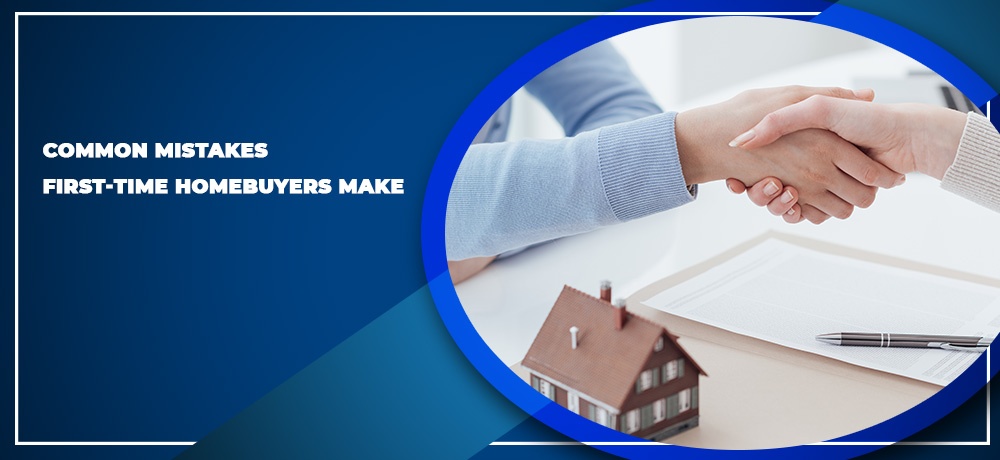Common Mistakes First-Time Homebuyers Make

Buying a house for the first time is a new and emotional experience, so it’s normal to have a few hiccups along the way. Since a home is the single most expensive purchase for some people, the entire process can also be tricky to navigate if you’ve never done it before. It’s necessary to find a mortgage agent you trust to assist lead you down the twists and turns on the exciting journey to homeownership. It is also beneficial to know some of the common mistakes first-time homebuyers make, so you can avoid them on your road to buying your first home and have a smooth experience with minimum stress.
Here are six common rookie mistakes made by first-time homebuyers.
1. Choosing a home before you do your homework
It’s more fun for people to look at homes than talking about their finances with a lender. So that’s what many first-time homebuyers do: they jump in too fast. They are disheartened when they realize they were looking in the incorrect price range (either too expensive or too cheap) or when they find the ideal home but cannot make a serious offer. The right way to go about house hunting is to do your homework to avoid potential pitfalls. You can also talk to a mortgage expert about getting pre-qualified or even pre-approved for a home loan before you begin to shop for a place seriously.
2. Choosing a fixer-upper home to save
While you might think you are saving money by purchasing a fixer-upper, you will break even or likely spend more. This is because repairs are expensive. Homebuyers who aren’t willing to invest their time, money, and energy into a fixer-upper could soon become overwhelmed. Negotiating a lengthy due diligence period will give you time to evaluate contractors if you need to back out. If you have a unique fixer-upper in mind that you want to buy, make sure you hire a professional who understands the fixer-upper market. With the proper guidance along your journey, you can discover various houses, place more favorable bids, and get the home you will build to love.
3. Buying a house you can’t afford
Before you begin looking around for properties, figure out how much you can afford. Don’t forgo retirement savings or an emergency fund for mortgage payments. It would help if you stayed intelligent to your life’s changes, and overextending yourself could put your expenses, including your home. So if you haven’t already, it’s time to look at how much of your income you are willing to spend on monthly mortgage payments. Ideally, a house payment should never cost more than 25% of your take-home pay. You can also utilize a mortgage affordability calculator to assist you in knowing what price range is affordable, what’s a stretch and what’s aggressive.
4. Choosing a house without researching the neighborhood
It’s essential to buy a home in a safe area. Imagine having the home of your dreams but getting annoying neighbors or a nearby industrial zone; it can be a rude awakening. It’s hard to perfectly predict the future of your chosen neighborhood, of course, but inquiring about or researching its prospect now can benefit you to avoid unpleasant surprises down the road. Consider talking to local business owners and residents to learn the pros and cons of living there. When you leave to shop for a new home, make sure the neighborhood is not just desirable to you, but it has objective features such as attractive facilities, maintained roads, and good schools, which will add value to your property over time.
5. Being fixated on lower interest rates
It’s natural to get excited about buying a home when mortgage rates are hovering near historic lows, as they are now, but it’s worth pausing to figure out whether you’re making an impulsive decision. Too often, first-timers get carried away by the first home they see, and they fail to weigh the financial responsibilities that come with buying a home. Regardless of low-interest rates, make a solid long-term plan to pay off your mortgage and then find one if it’s flexible enough to adjust to life changes, both planned and unexpected. After considering these factors, you can initiate your home buying process. You can also consult a professional who will be able to assist you in this process and help you make the right choice
6. Opting out of mortgage insurance
Purchasing a house is the single most significant investment for most people. It is a difficult task that requires a lot of planning, saving and research. However, the fact that you can own a home without a home insurance policy makes us overlook the home insurance concept on the whole. Most of us feel that it is a waste of funds as it is a particular investment for an uncertain cause. But the fact is that mortgage insurance gives you peace of mind and allows for more flexible financing options. With the rise in natural calamities, it is good to take up a little expense to avoid a substantial monetary setback in the future. Plus, it lets you take advantage of available equity to pay down debts or make financial investments.
To avoid these and other mistakes made while buying your mortgage, reach out to me at Mortgage Broker Erin. With over ten years of experience, my team and I have successfully served hundreds of people to realize their dream of homeownership. My passion for assisting others is the driving force behind my business and the way I operate it. For a complete list of services we offer, please click here. For any questions related to our mortgage offerings, please feel free to contact us by clicking here.